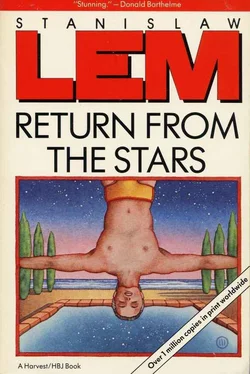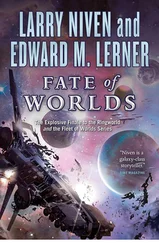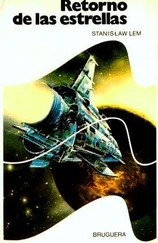“That’s in order. The state of the account: twenty-six thousand, four hundred and seven ets.”
“Ets?”
“Yes. Do you require anything further?”
“I would like to withdraw a little mon — some ets, that is.”
“In what form? Perhaps you would like a calster?”
“What is that? A checkbook?”
“No. You will be able to pay cash right away.”
“Yes. Good.”
“How high should the calster be?”
“I really don’t know — five thousand…”
“Five thousand. Good. Should it be sent to your hotel?”
“Yes. Wait — I’ve forgotten the name of this hotel.”
“Is it not the one from which you are calling?”
“It is.”
“That is the Alcaron. We will send you the calster right away. But there is one more thing: your right hand has not changed, has it?”
“No. Why?”
“Nothing. If it had, we would need to change the calster. You will receive it very soon.”
“Thank you,” I said, putting down the receiver. Twenty-six thousand, how much was that? I did not have the faintest idea. Something began to hum. A radio? It was the phone. I picked up the receiver.
“Bregg?”
“Yes,” I said. My heart beat stronger, but only for a moment. I recognized her voice. “How did you know where I was?” I asked, for she did not speak immediately.
“From an infer. Bregg… Hal… listen, I wanted to explain to you…”
“There is nothing to explain, Nais.”
“You’re angry. But try to understand…”
“I’m not angry.”
“Hal, really. Come over to my place today. You’ll come?”
“No, Nais; tell me, please — how much is twenty-six thousand ets?”
“What do you mean, how much? Hal, you have to come.”
“Well… how long can one live on that much?”
“As long as you like. Living costs nothing, after all. But let’s forget about that. Hal, if you wanted to…”
“Wait. How many ets do you spend in a month?”
“It varies. Sometimes twenty, sometimes five, or nothing.”
“Aha. Thank you.”
“Hal! Listen!”
“I’m listening.”
“Let’s not end it this way…”
“We’re not ending a thing,” I said, “because nothing ever began. Thanks for everything, Nais.”
I put down the receiver. Living costs nothing? That interested me most at the moment. Did that mean that there were some things, some services, free of charge?
The telephone again.
“Bregg here.”
“This is reception. Mr. Bregg, Omnilox has sent you a calster. I am sending it up.”
“Thank you — hello!”
“Yes?”
“Does one pay for a room?”
“No, sir.”
“Nothing?”
“Nothing, sir.”
“And is there a restaurant in the hotel?”
“Yes, there are four. Do you wish to have breakfast in your room?”
“All right, and… does one pay for meals?”
“No, sir. You now have the calster. Breakfast will be served in a moment.”
The robot hung up, and I did not have time to ask where I was supposed to look for the calster. I had no idea what it looked like. Getting up from the desk, which, abandoned, immediately shrank and shriveled up, I saw a kind of stand growing out of the wall next to the door; on it lay a flat object wrapped in transparent plastic and resembling a small cigarette case. On one side it had a row of little windows, in them showed the number 1100 1000. At the bottom were two tiny buttons labeled “1” and “0.” I looked at it, puzzled, until I realized that the sum of five thousand had been entered in the binary system. I pressed the “1” and a small plastic triangle with the number 1 stamped on it fell into my hand. This, then, was a kind of stamping machine or press for money, up to the amount indicated in the windows — the number at the top decreased by a unit.
I was dressed and ready to leave when I remembered about Adapt. I phoned and told them that I had been unable to find their man at the Terminal.
“We were getting worried about you,” said a woman’s voice, “but we learned this morning that you were staying at the Alcaron…”
They knew where I was. Why, then, had they not found me at the station? Planned that way, no doubt. I was supposed to get lost, so as to realize how rash my “rebellion” on Luna had been.
“Your information is correct,” I replied politely. “At present I am going out to see the city. I’ll report to you later.”
I left the room; corridors flowed, silver and in motion, and the wall along with them — something new to me. I took an escalator down and on successive floors passed bars; one of them was green, as if submerged in water; each level had its own dominant color, silver, gold, already this had begun to annoy me. And after a single day! Odd that they liked it. Strange tastes. But then I recalled the view of the Terminal at night,
I needed to get myself some clothes. With that decision I stepped out into the street. The sky was overcast, but the clouds were bright, high up, and the sun shone through them occasionally. Only now did I see — from the boulevard, down the center of which ran a double line of huge palms with leaves as pink as tongues — a panorama of the city. The buildings stood like islands, set apart, and here and there a spire soared to the heavens, a frozen jet of some liquid material, its height incredible. They were no doubt measured in whole kilometers. I knew — someone had told me back on Luna — that no one built them any more and that the rush to construct tall buildings had died a natural death soon after these had been put up. They were monuments to a particular architectural epoch, since, apart from their immensity, offset only by their slimness of form, there was nothing in them to appeal to the eye. They looked like pipes, brown and gold, black and white, transversely striped, or silver, serving to support or trap the clouds, and the landing pads that jutted out from them against the sky, hanging in the air on tubular supports, were reminiscent of bookshelves.
Much more attractive were the new buildings, without windows, so that all their walls could be decorated. The entire city took on the appearance of a gigantic art exhibit, a showcase for masters of color and form. I cannot say that I liked everything that adorned those twenty- and thirty-floor heights, but for a hundred-and-fifty-year-old character I was not, I dare say, overly stuffy. To my mind the most attractive were the buildings divided in half by gardens. Maybe they were not houses — the fact that the structures were cut in the middle and seemed to rest on cushions of air (the walls of those high-level gardens being of glass) gave an impression of lightness; at the same time pleasantly irregular belts of ruffled green cut across the edifices.
On the boulevards, along those lines of fleshlike palms, which I definitely did not like, flowed two rivers of black automobiles. I knew now that they were called gleeders. Above the buildings flew other machines, though not helicopters or planes; they looked like pencils sharpened at both ends.
On the walkways were a few people, but not as many as there had been in the city a hundred years earlier. There had been a marked easing of traffic, pedestrian especially, perhaps because of the multiplication of levels, for beneath the city that I had seen spread successive, lower, subterranean tiers, with streets, squares, stores — a corner infor told me, for example, that it was best to shop at the Serean level. It was a first-rate infor, or maybe by now I was expressing myself better, because it gave me a little plastic book with four fold-outs, maps of the city’s transit system. When I wanted to go somewhere, I touched the silver-printed name — street, level, square — and instantly on the map a circuit of all the necessary connections lit up. I could also travel by gleeder. Or by rast. Or — finally — on foot; therefore, four maps. But I realized now that traveling on foot (even with the moving walkways and escalators) often took many hours.
Читать дальше











